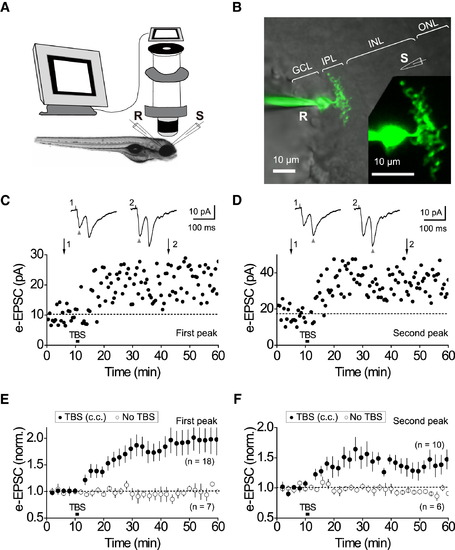Fig. 1
- ID
- ZDB-FIG-120824-21
- Publication
- Wei et al., 2012 - Activity-induced long-term potentiation of excitatory synapses in developing zebrafish retina in vivo
- Other Figures
- All Figure Page
- Back to All Figure Page
|
Induction of LTP at BC-RGC Synapses by TBS(A) Diagram of the experimental setup, depicting in vivo perforated whole-cell recording in zebrafish larva retina, is illustrated. R, recording electrode; S, extracellular stimulation electrode.(B) A bright-field image showing the retinal structure of a 4 dpf zebrafish larva is presented. The inset shows the morphology of a RGC, which was filled with lucifer yellow after recording. The dendrites of the RGC ramify in the proximal part (sublamina b) of the IPL. An extracellular stimulation electrode (“S”) was placed near the soma of BCs in the INL. GCL, ganglion cell layer; ONL, outer nuclear layer.(C and D) An example of changes in the amplitude of the first (C) and second (D) peaks in RGC e-EPSCs (at 60mV) following TBS, with the RGC held in c.c., is shown. Sample e-EPSCs are averages of 20 events around the time marked by the numbered arrows. The data shown in (C) and (D) were obtained from the same RGC. The gray arrowheads mark the first (C) and second (D) peaks of e-EPSCs analyzed, respectively.(E and F) Summary of changes in the amplitude of the first (E) and second (F) peaks in RGC e-EPSCs (at 60mV) following TBS (filled circles) or in absence of TBS (open circles), is shown. The data were normalized (norm.) by the mean value (dotted line) observed before TBS. The number in the brackets indicates the number of RGCs examined. Error bars, ± SEM.See also Figures S1 and S2. |

